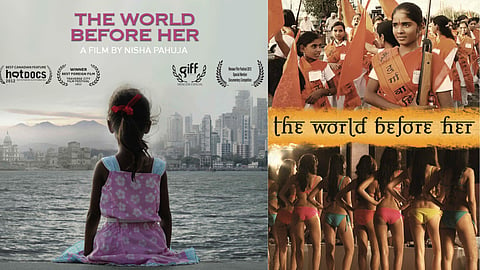
- HOMEGROWN WORLD
- #HGCREATORS
- #HGEXPLORE
- #HGVOICES
- #HGSHOP
- CAREERS
- ABOUT US
- CONTACT US

Simone de Beauvoir famously wrote, “One is not born, but rather becomes, a woman.” With this, she argued that womanhood is not a natural state but a construct imposed by social, cultural, and political forces. From the moment of birth, a girl learns that her worth will not be self-evident but measured against ideals designed to control her: beauty, purity, obedience, and ambition. These ideals masquerade as choices, but they are bound to systems that sustain patriarchal power. A woman enters the world before her already scripted, taught that to belong she must live by its rules.
Nisha Pahuja’s documentary 'The World Before Her' makes this condition startlingly visible. The film maps two worlds that appear at extreme ends of a spectrum, yet continue to bind women with the same invisible chain. On one end, there’s the Miss India beauty boot-camp, where young women undergo Botox, skin-whitening, and seemingly endless grooming. They're continuously objectified, sacrificing autonomy for glittering conquest. On the other end, the militant Durga Vahini camp trains girls to wield weapons and chant nationalist and religious fundamentalist slogans, suppressing not just others, but their own will, for purity and duty.
In both systems, women are taught that their worth lies in fulfilling someone else’s ideal. The models are hyper-feminised, taught that beauty is liberation, yet they endure cosmetic procedures and crave hollow validation for male desire. The Durga Vahini girls covet discipline and embrace masculinity wrapped in saffron rituals. They're taught that 'purity' redeems them, even if it costs them equality, freedom, and ambition.
Prachi, the camp instructor, confesses, “I like when other girls are scared of me,” grasping for a twisted talisman of power in a system that denies her autonomy. Yet, her father imposes the same final duty on her: marriage. Her 'control' is an illusion; not too different from the world of pageantry that she detests. Meanwhile, the Miss World participants prize ambition and identity, but their self-made freedom exacts a body-centric toll: painful treatments, humiliation, and the performance of self-worth under scrutiny.
Throughout the film, the language of character and culture surfaces repeatedly. Both camps wield them as instruments: for the pageant girls, tradition and culture are framed as shackles to be broken, yet their rebellion pulls them into the trap of objectification; for the Durga Vahini, culture becomes a rallying cry against Western influence, where a woman’s character is preserved only through piety and submission. In both cases, ‘character’ is not a quality women define for themselves but a tool of control. No matter the ideal, whether it's purity or modernity, it is a woman who must bear the burden of achieving it within these men-crafted illusions of empowerment.
Yet despite their conditioning, both camp instructor Prachi and Miss World contestant Ankita reveal the ghost of self-awareness that haunts them. Prachi, even amidst propaganda, admits she doesn’t wish to be a product of the environment she is enforcing. Ankita, even amidst glitz, chafes at the cost of ambition, uneasy with what the dream demands of her body and soul.
These two emblematic women become mirror-images, both deriving 'purpose' from the system offered: one from nationalism and militant empowerment; the other from modern ambition and the stage. Neither is free, but both grasp agency in what they believe is their fight. In the film’s unjudging gaze, we sense that both understand — they’re cogs in a machine, however gilded or godly it may be.
'The World Before Her', premiered at the Tribeca Film Festival in 2012, where it won Best Documentary, and went on to receive the World Documentary Award at Hot Docs, the Amnesty International Human Rights Award in Berlin, and a place on the Academy Award shortlist. The film travelled widely on the festival circuit. Nisha Pahuja, an Indo-Canadian filmmaker, has consistently explored the intersections of gender, politics, and identity in India, and is widely regarded for her ability to hold contradictions in plain view without collapsing them into easy binaries.
In this documentary, which remains relevant to this day, she invites us into this dual drama where women are caught in the same double bind. In her sublime tapestry of India’s two faces — hyper-femininity and aggressive purity — the film highlights how beauty and fundamentalism are merely two veils drawn over the same shackles. Between skin and saffron, lies the bleak echo: through the trials of a system that is set up against her, a woman must become worthy to exist.
Follow Nisha Pahuja here and watch the documentary below:
If you enjoyed reading this here's more from Homegrown:
Nisha Pahuja’s New Documentary Chronicles A Father’s Fight Against Rape Culture In India
Paromita Vohra's Thoughtful 2002 Documentary Asks What It Means To Be An Indian Feminist
'Khush': How A 1991 Documentary Captured The Queer Voices Of The South Asian Diaspora
